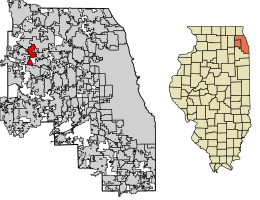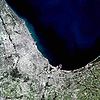Hanover Park, Illinois
It has been suggested that Ontarioville, Illinois be merged into this article. (Discuss) Proposed since October 2024. |
Hanover Park, Illinois | |
|---|---|
Village | |
| Village of Hanover Park, Illinois | |
 Location of Hanover Park in Cook and DuPage County, Illinois. | |
| Coordinates: 41°58′44″N 88°8′46″W / 41.97889°N 88.14611°W | |
| Country | |
| State | Illinois |
| Counties | Cook, DuPage |
| Township | Hanover, Schaumburg, Wayne, Bloomingdale |
| Incorporated | 1958 |
| Government | |
| • Type | Council–manager |
| • President | Rodney Craig |
| Area | |
| • Total | 6.52 sq mi (16.90 km2) |
| • Land | 6.42 sq mi (16.63 km2) |
| • Water | 0.10 sq mi (0.27 km2) 1.56% |
| Population (2020) | |
| • Total | 37,470 |
| • Density | 5,834.63/sq mi (2,252.75/km2) |
| Down 0.80% from 2000 | |
| Standard of living (2009-11) | |
| • Per capita income | $21,587 |
| • Median home value | $198,100 |
| ZIP code(s) | 60133 |
| Area code(s) | 630 and 331 |
| Geocode | 32746 |
| FIPS code | 17-32746 |
| Website | hanoverparkillinois |
Hanover Park is a village in Cook and DuPage counties in the U.S. state of Illinois, a suburb of Chicago. The population was 37,470 at the 2020 census. Ontarioville is a neighborhood within the village.
History
[edit]Ontarioville was initially the name assigned to the village of Hanover Park, a municipality situated on the border of Cook and DuPage Counties. Back in 1836, a stagecoach service transported residents along Lake Trail (also known as Grant Highway and later renamed Lake Street) all the way to Galena. By 1872, the Chicago & Pacific Railroad (later known as the Chicago, Milwaukee & St. Paul) installed railway tracks on land donated by Edwin Bartlett, who contributed over seven acres for the establishment of a depot.[2]
Geography
[edit]Hanover Park is located at 41°58′44″N 88°8′46″W / 41.97889°N 88.14611°W (41.978827, −88.146109).[3]
According to the 2021 census gazetteer files, Hanover Park has a total area of 6.53 square miles (16.91 km2), of which 6.42 square miles (16.63 km2) (or 98.42%) is land and 0.10 square miles (0.26 km2) (or 1.58%) is water.[4]
Demographics
[edit]| Census | Pop. | Note | %± |
|---|---|---|---|
| 1960 | 451 | — | |
| 1970 | 11,735 | 2,502.0% | |
| 1980 | 28,719 | 144.7% | |
| 1990 | 32,895 | 14.5% | |
| 2000 | 38,278 | 16.4% | |
| 2010 | 37,973 | −0.8% | |
| 2020 | 37,470 | −1.3% | |
| U.S. Decennial Census[5] 2010[6] 2020[7] | |||
As of the 2020 census[8] there were 37,470 people, 11,064 households, and 9,177 families residing in the village. The population density was 5,742.53 inhabitants per square mile (2,217.20/km2). There were 11,732 housing units at an average density of 1,798.01 per square mile (694.22/km2). The racial makeup of the village was 37.14% White, 7.10% African American, 1.64% Native American, 17.02% Asian, 0.06% Pacific Islander, 21.38% from other races, and 15.67% from two or more races. Hispanic or Latino of any race were 41.53% of the population.
There were 11,064 households, out of which 44.2% had children under the age of 18 living with them, 59.01% were married couples living together, 16.99% had a female householder with no husband present, and 17.06% were non-families. 12.41% of all households were made up of individuals, and 4.98% had someone living alone who was 65 years of age or older. The average household size was 3.71 and the average family size was 3.42.
The village's age distribution consisted of 27.9% under the age of 18, 9.1% from 18 to 24, 28.5% from 25 to 44, 24.1% from 45 to 64, and 10.4% who were 65 years of age or older. The median age was 34.2 years. For every 100 females, there were 90.9 males. For every 100 females age 18 and over, there were 95.8 males.
The median income for a household in the village was $77,367, and the median income for a family was $80,815. Males had a median income of $43,375 versus $31,368 for females. The per capita income for the village was $26,823. About 11.4% of families and 12.8% of the population were below the poverty line, including 18.6% of those under age 18 and 10.4% of those age 65 or over.
| Race / Ethnicity (NH = Non-Hispanic) | Pop 2000[9] | Pop 2010[6] | Pop 2020[7] | % 2000 | % 2010 | % 2020 |
|---|---|---|---|---|---|---|
| White alone (NH) | 20,474 | 14,423 | 11,885 | 53.49% | 37.98% | 31.72% |
| Black or African American alone (NH) | 2,243 | 2,509 | 2,537 | 5.86% | 6.61% | 6.77% |
| Native American or Alaska Native alone (NH) | 61 | 62 | 59 | 0.16% | 0.16% | 0.16% |
| Asian alone (NH) | 4,520 | 5,711 | 6,326 | 11.81% | 15.04% | 16.88% |
| Pacific Islander alone (NH) | 5 | 5 | 20 | 0.01% | 0.01% | 0.05% |
| Other race alone (NH) | 54 | 61 | 158 | 0.14% | 0.16% | 0.42% |
| Mixed race or Multiracial (NH) | 688 | 670 | 924 | 1.80% | 1.76% | 2.47% |
| Hispanic or Latino (any race) | 10,233 | 14,532 | 15,561 | 26.73% | 38.27% | 41.53% |
| Total | 38,278 | 37,973 | 37,470 | 100.00% | 100.00% | 100.00% |
Education
[edit]The town is served by several school districts. One is Elgin Area School District U46, a Unit School District. It serves an area of some 90 square miles (230 km2) in Cook, DuPage and Kane Counties. Almost 40,000 children of school age are in its area. U-46 is the second largest in Illinois behind Chicago Public Schools. Other school districts serving Hanover Park include Schaumburg Township Elementary School District 54, Township High School District 211, Community Consolidated School District 93, Glenbard Township High School District 87, Keeneyville School District 20 and Lake Park High School District 108. A total of six different public high schools serve the village.
- Streamwood High School
- Bartlett High School
- Schaumburg High School
- Hoffman Estates High School
- Lake Park High School
- Glenbard North High School

Transportation
[edit]Hanover Park has a station on Metra's Milwaukee District West Line, which provides daily rail service between Elgin, Illinois and Chicago, Illinois (at Union Station). In Metra's zone-based fare system, Hanover Park is in zone F.
Pace provides bus service on Route 554 connecting Hanover Park to Elgin, Schaumburg, and other destinations.[10]
Notable residents
[edit]- Jeffrey and Jill Erickson, bank robber couple[11]
- Jon Walker, bassist from American pop punk pop band Panic! At The Disco and lead guitarist (and occasionally the lead singer) of The Young Veins
Parks and libraries
[edit]The Hanover Park Park District is a general park district established by the voters of Hanover Park in 1964. The park district is responsible for the maintenance, operation and administration of parks and park facilities and is governed by five commissioners elected at large for overlapping, four-year terms.
The Hanover Park Park District maintains 21 park sites encompassing128 acres (0.52 km2).
- Poplar Creek Public Library District[12]
- Schaumburg Township District Library - serves area of Hanover Park in Schaumburg Township (Cook County - east of Barrington Rd and north of Barrington and Lake St.)
- Hanover Park Park District[13]
Sister cities
[edit] Cape Coast, Ghana
Cape Coast, Ghana Valparaíso, Mexico
Valparaíso, Mexico
References
[edit]- ^ "2020 U.S. Gazetteer Files". United States Census Bureau. Retrieved March 15, 2022.
- ^ "Hanover Park, IL". www.encyclopedia.chicagohistory.org. Retrieved March 3, 2024.
- ^ "US Gazetteer files: 2010, 2000, and 1990". United States Census Bureau. February 12, 2011. Retrieved April 23, 2011.
- ^ "Gazetteer Files". Census.gov. Retrieved June 29, 2022.
- ^ "Decennial Census of Population and Housing by Decades". US Census Bureau.
- ^ a b "P2 Hispanic or Latino, and Not Hispanic or Latino by Race – 2010: DEC Redistricting Data (PL 94-171) – Hanover Park village, Illinois". United States Census Bureau.
- ^ a b "P2 Hispanic or Latino, and Not Hispanic or Latino by Race – 2020: DEC Redistricting Data (PL 94-171) – Hanover Park village, Illinois". United States Census Bureau.
- ^ "Explore Census Data". data.census.gov. Retrieved June 28, 2022.
- ^ "P004: Hispanic or Latino, and Not Hispanic or Latino by Race – 2000: DEC Summary File 1 – Hanover Park village, Illinois". United States Census Bureau.
- ^ "RTA System Map" (PDF). Retrieved January 30, 2024.
- ^ Green, Michelle (March 2, 1992) "Bloody Ending to a Double Life", People. Retrieved March 4, 2020.
- ^ Poplar Creek Public Library District Plarcreek.lib.il.us [permanent dead link]
- ^ "Hanover Park Park District". hpparks. Retrieved March 3, 2024.
External links
[edit]- Hanover Park, Illinois
- Villages in Cook County, Illinois
- Chicago metropolitan area
- Villages in DuPage County, Illinois
- Populated places established in 1958
- 1958 establishments in Illinois
- Majority-minority cities and towns in Cook County, Illinois
- Majority-minority cities and towns in DuPage County, Illinois





